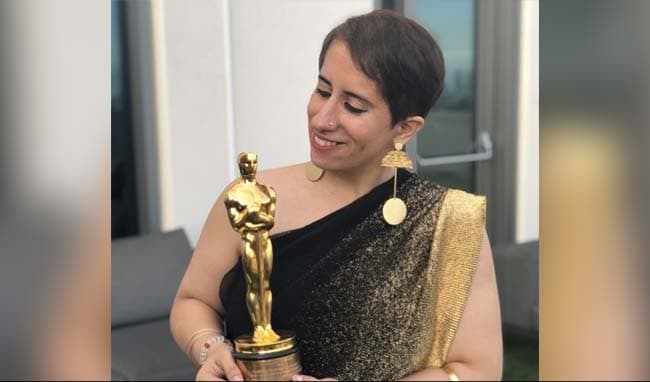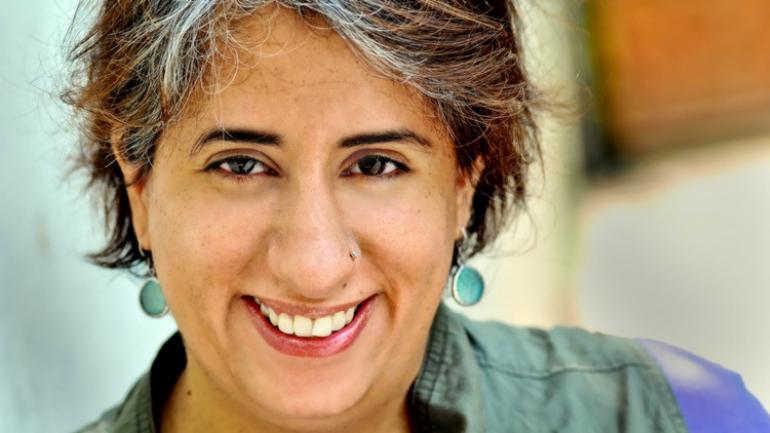Guneet Monga: “I will continue telling stories that resonate with us”

By Neeru Saluja
Meet Guneet Monga, whose documentary on menstruation taboos, ”˜Period. End of Sentence’ has won the Oscars in the Documentary Short Subject category.
The documentary, currently streaming on Netflix, was part of The Pad Project, started by students at the Oakwood School in Los Angeles and their teacher, Melissa Berton. Set in a village in western Uttar Pradesh’s Hapur district, the film centres on the lives of women as they fight against the deeply rooted stigma of menstruation.
As the founder of Sikhya Entertainment, Guneet Monga also has the award winning films Gangs of Wasseypur, Masaan, The Lunchbox, Monsoon Shootout, to her credit. She was at the Indian Film Festival in Melbourne recently to talk about her documentary ”˜Period’.

How was the experience talking about your documentary at the Indian Film Festival in Melbourne?
Mitu Bhowmick Lange, the director of the festival and her entire team puts their heart out to this festival. The emotion that I felt from the festival is that it is done with so much love and this was resonated from the audience. People asked some interesting questions, it was also a great experience to see the documentary on the big screen.
Congratulations on winning the Oscar for ”˜Period’. How would you describe your ”˜Oscar’ moment?
It was beyond belief. I feel very grateful for this. I was shivering and crying in the Dolby theatre. When they said the ”˜P’ of Period we started jumping and crying. I could not hear anything else, just a feeling of numbness for 4-5 minutes.
What inspired you to make the documentary and how did the process start?
The inspiration and how the story started came from ten 12-14 year old schoolgirls who were on a journey to fund raise for donating a pad machine. Somehow down the lane they thought of documenting the process of donating the machine, maybe we can make a film out of this and raise more funds to donate more pad machines. I was in awe of them and their English teacher and that’s where the inspiration came from and the process started.
While making the documentary, what was the most shocking revelation you discovered about menstruation?
India is a large country and there are places that are far more under developed. I was also aware of the social taboos and was well prepared for that. But there were two particular things that surprised me – that there are taboos in America too, and the schoolgirls resonated that they found it difficult to articulate about the shame attached to it. I thought that the first world countries would be far more open towards this. The tax is very high across menstruation products in States. Women are fighting the same taboo there. To actually see the women in India actually open up and talk in front of the camera in Hapur village also surprised me.
Why did you base the documentary in the Hapur village?
Because we worked with an NGO called ”˜Action India’ which has worked with women’s health and hygiene for 40 years. This was their base and an’ Action India’ working village. That’s how they introduced us to the village. All these girls embraced the camera and allowed us to follow them. The entire team did a fabulous job of capturing the journey of the pad machine.
You are known as the most prolific producer of new wave cinema. How would you define ”˜new wave’ cinema in your words?
Firstly, thank you. I think I am an independent producer telling stories that resonate with us emotionally. The new wave is more independent and coming from the younger directors. We are also taking these films globally. After a decade long work we can join these dots and see the arrival of independent cinema. The decision of making films doesn’t start with an aim to bring a change, it happens retrospectively when the film is appreciated. I’m excited that with Netflix and Amazon we now have bigger platforms where we can reach our audience.
What kind of stories is Sikhya Entertainment looking for in the future?
I will continue to tell stories that speak from the heart. We are divided by caste, colour and creed but we all have the same emotions about love, loss and grief. And that’s what took films like Masaan, Haramkhor and Lunchbox forward. It’s been fun being on this journey and I can’t wait to put out more such films to the world.
Short URL: https://indiandownunder.com.au/?p=14238
